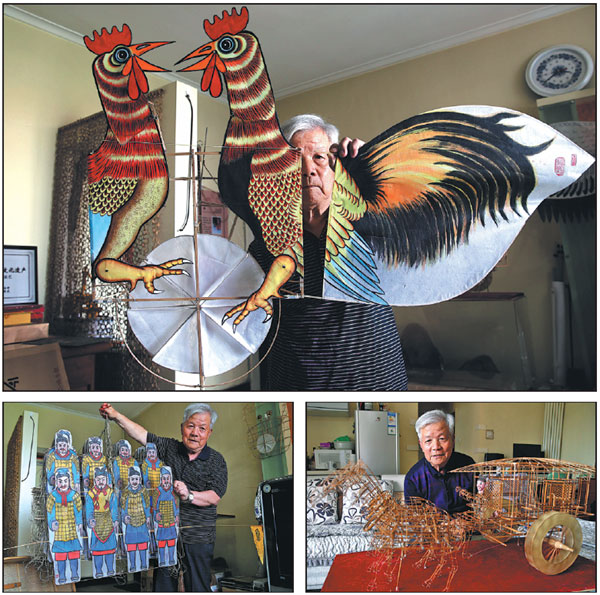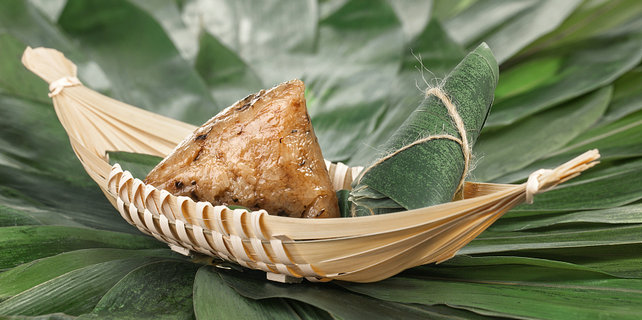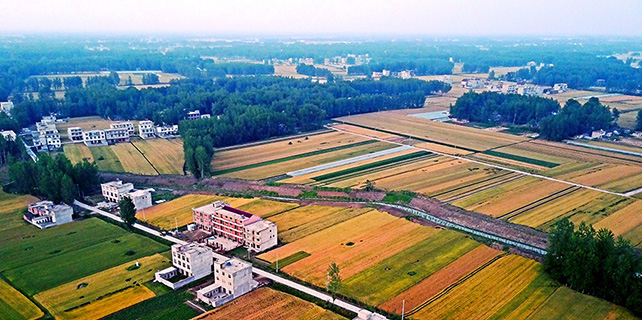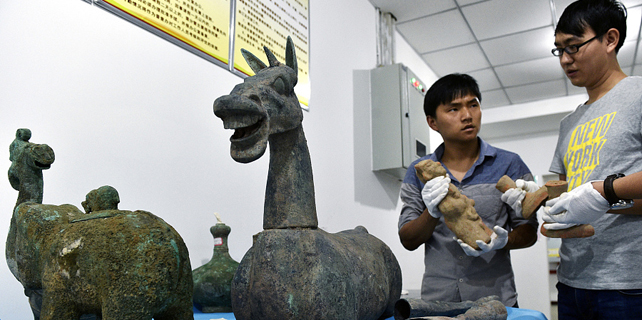A dream that can fly in the sky
Kite maker sees his creations soar as he dazzles spectators with the colors and vision of his imagination
Can humans think in their dreams? Zhang Tianwei has no doubts about the answer. "Yes, I do."
The 79-year-old industrial artist and a retired technician has "thought out" solutions in his dreams to difficult aeronautical engineering problems at least twice in the past three decades. The results are plain to see as his "dynamic kites" in various shapes and sizes astound spectators as they seem to dance and frolic in the sky.
Zhang's kites can make nine movements simultaneously, propelled just by the wind, through built-in gearing systems, which are all handmade from simple raw materials like bamboo, wood and thread.
|
Zhang Tianwei carefully creates his kites using skills and techniques finely honed over the decades. His wife, Zhang Xiuzhen, also plays a key role in assembling the kite. Huo Yan / China Daily |
|
Zhang Tianwei displays his elaborate and delicate works of art depicting people and creatures. Huo Yan / China Daily |
"The most useful metal pieces come from soft-drink cans, because the aluminum alloy is strong, corrosion resistant and malleable," said Zhang, pointing to a can on his table-turned workbench at home in Xi'an, Shaanxi province.
He cuts the can into 2-millimeter wide strips to make the "teeth" of the gear with a pliers, and a wheel is made from thick bamboo skin strips.
The wind wheel's axle is made from a pencil. He drills small holes into it and inserts thin wooden sticks, 1.5 millimeters in diameter, to fasten cloth or paper, which form the blades of a propeller.
"The diameter of the hole must not be wider than that, otherwise the stick would not be fastened properly," said Zhang. "Any minor errors would end in failure after days of hard work."
With a gust of wind to the wheels of one of his creations, a horse-and-cart frame made up of more than 1,500 pieces of bamboo skin strips tied together with nearly 5,000 knots, the "four-horses" can appear to gallop, shake their heads and swing their tails, and a "rider" can also move his arms to rein in the horses.
To raise the 2-kilogram structure into the air, it takes a 40-meter long kite combination, made up of 192 life-size Terrecotta Warrior kites in eight square formations.
Born into an industrial artist's family, Zhang learned how to make conventional kites from his father and grandfather from the tender age of 10. In the 1930s, his father was famous for making big kites "like small planes" in Xi'an.
But what motivated him to innovate the designs of a traditional kite was his participation in the 1986 First National Kite Competition in Weifang, Shandong province, as a representative of Shaanxi.
Although Zhang won a silver medal, the only medal the Shaanxi delegation obtained in that year's contest, he felt he had to improve.
"Weifang is the most famous place in China for its kite history and techniques. It was an eye-opening experience," he said. "They have reached such a height in applying conventional kite making skills that if I do not have my own unique strength and style it is almost impossible to win."
A book about a kite master, Wei Yuantai from Tianjin, which caught his attention in the 1950s when he was in junior middle school, proved inspirational. Wei was good at making kites that can seem to transform into various "creatures", such as a cock fighting in the sky. But this particular skill had largely vanished in the 1940s.
Graduating from a vocational school where he learned about machinery, Zhang believes his expertise in mechanics was a foundation for him to study Wei's works, and recover and revive the old-kite making techniques and improve them.
He started designing and making the elaborate kites in his own style after coming back from Weifang. "Conceiving the structure and the gearing system is the first difficult step, and then making the parts takes much longer and patience," Zhang said.
To make a crane kite open its mouth, swing its head, flap its wings and move its legs in the sky simultaneously, he must conduct a number of experiments to adjust his design and the parts to reach the "perfect" match.
His wife has been supportive but admits it was hard to understand at first. "I really could not understand his mania in making kites," Zhang Xiuzhen, 74, said. "But when I saw his happiness after making even a small breakthrough over these years. I gradually realized that making kites is a family heritage and part of his life."
Xiuzhen is now a skillful and experienced kite flyer in her own right, and "an important partner" to her husband in doing many kinds of experiments.
Zhang Tianwei appreciates her support and understanding.
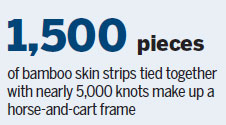
He made fewer than 50 of his "dynamic kites" in 31 years, and every one is unique. "I always want to try new ideas in the next," Zhang said.
His works were shown in the Shanghai Expo in 2010 and appeared on Canada Post stamps in the 1990s. Foreign collectors bought his works. One of Zhang's concerns is that the craft may be lost after he passes away, as it is almost impossible to copy the kite, let alone learn the techniques, by just studying the blueprints.
Zhang is meticulous in drawing detailed blueprints for each of his works to help maintain the knowledge for future generations.
However, neither of Zhang's three sons are interested in learning his skills.
As a provincial intangible cultural heritage, Zhang hopes the government can digitalize his kite-making process in a more reader-friendly 3D format on computer to let young people experience the "mentally absorbing and brain-burning" tricks.
Contact the writers at liyang@chinadaily.com.cn
(China Daily 05/29/2017 page5)





